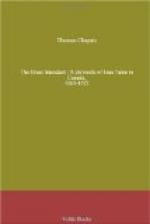Talon and his colleagues, Tracy and Courcelle, had to deal with the question of tithes. In 1663 tithes had been fixed by royal edict at one-thirteenth of all that is produced from the soil either naturally or by man’s labour. This edict was prompted by the erection of the Quebec Seminary by Laval, and established in Canada the tithes system for the benefit of the new clerical institution, to which was entrusted the spiritual care of the colonists. The latter, who previously had paid nothing for the maintenance of the clergy, protested against the charge, notwithstanding that it was in conformity with the common practice of Christian nations. Laval, taking into consideration the poverty of the colony at the time, freely granted delays and exemptions, so that in 1667 the question was still practically in abeyance. In that year the bishop presented to Tracy a petition for the publication of a decree in respect to the tithes. The lieutenant-general, the governor, and the intendant gave the matter their attention, and after discussion an ordinance was passed for payment of tithes, consisting of the twenty-sixth part of all that the soil grows, naturally or by man’s labour, for the benefit of the priests who ministered to the spiritual wants of the people. There was a proviso stating that the words ’by man’s labour’ did not include manufactures or fisheries, but only the products of the soil when cultivated and fertilized by human industry. The assessment of one-twenty-sixth was to be levied for a term of twenty years only, after which the tithes were to be fixed according to the needs of the time and the state of the country. Later on, in 1679, a royal edict made perpetual the rate of one-twenty-sixth. For years the practice prevailed of levying tithes only on grain. But in 1705 two parish priests maintained that they should be levied also on hemp, flax, tobacco, pumpkins, hay—on all that is grown on cultivated land. A heated discussion in the Sovereign Council took place, led by the attorney-general Auteuil. The two priests contended that the ordinance of Tracy, Courcelle, and Talon did not limit the tithes to grain; it stated that they should be levied on all that the soil grows naturally or by man’s labour. Unfortunately they had only a copy of the ordinance of 1667 to file in support of their contention. The attorney-general maintained that the original ordinance of 1663 limited the tithes to grain, and that the constant practice was a confirmation and an evidence of the rule. But, strange to say, he could not put the original ordinance on record. It had been lost. However, the practice was held to decide the case, and the priests’ contention was not sustained. From that time the question was settled, definitely and for ever; the tithes were levied only on grain, as they are still levied in the province of Quebec, on all lands owned by Catholics. But it is interesting to know as a matter of history that the two litigant priests were right. Had the original ordinance been before the council, it would have been found to enact the levying of tithes not on grain alone but on ’all that the soil grows naturally or by man’s labour.’ An authentic copy of this ordinance was discovered in our day, nearly two centuries after the lawsuit of 1705, and it bears out the plea of the two priests.




